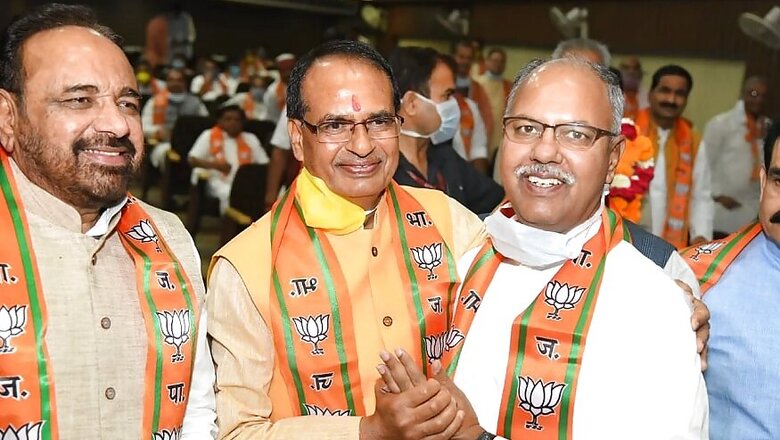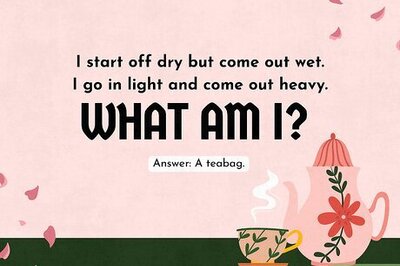
views
It was indeed a sweet revenge for BJP leader Shivraj Singh Chouhan who took over as the Madhya Pradesh chief minister for the fourth time on Monday night, snatching power from Congress veteran Kamal Nath just 15 months after he handed over the state to him.
Nath resigned on March 20 before facing the Supreme Court-mandated trust vote. The vote was necessitated after former union minister Jyotiraditya Scindia and 22 Congress legislators in his camp quit and joined the BJP, with the Congress alleging that the saffron party was indulging in the toppling game.
Chouhan, known as “Mamaji”, is an interesting choice for various reasons. The 61-year-old BJP leader was the chief minister for 13 uninterrupted years till 2018. He had been at the centre- stage of Madhya Pradesh politics since the time he took over in 2005. He had stuck to Madhya Pradesh and continued to dabble in the state politics though he was made the national vice-president. He even declined to contest the 2019 Lok Sabha polls.
Political compulsions went in favour of Chouhan, who was considered as a rival to Modi’s prime ministerial candidature in 2013, being picked as the CM again despite there being other prominent contenders. Chouhan was also seen as close to former BJP chief LK Advani. But things have changed now. Today, Modi has emerged as a much stronger leader even overtaking former Prime Minister Atal Bihari Vajpayee in terms of popularity.
He has proved that he is not only a crowd puller but also a vote catcher both in 2014 and 2019 Lok Sabha polls. He has also risen in stature in the world, finding a place in the high table after rubbing shoulders with global leaders these past five-and-half years.
As for the caste factor, Chouhan has proved himself as an effective backward class leader. He entered electoral politics in the early nineties and has dug in his heels in the state. His caste also was one of the reasons for the choice as Modi and Amit Shah found that in the other BJP-ruled states, CMs were mostly the forward castes, be it Adityanath in UP, Yediyurappa in Karnataka or Khattar in Haryana.
Interestingly, Madhya Pradesh is not as caste-oriented as neighbouring Bihar or Uttar Pradesh. Though caste is one of the important factors, it is not the defining factor. The original people of the state were mostly tribals and they consider all others as migrants. The state now has a very mixed population with substantial populations of Brahmins, Marathas, Telugus, Odiyas and Gujaratis as it borders on Maharashtra, Gujarat, Rajashtan and Jharkhand.
Moreover, as chief minister, Chouhan had built in the past 15 years a social coalition of upper castes, who had traditionally been with the party, Other Backward Classes (OBC) to which he himself belongs and segments of Dalits and tribals.
Also, there was a view in the leadership that after losing state after state in recent times, popular leaders like him should be encouraged. He also came closer to the RSS with his efforts to introduce yoga classes and Vande Mataram in schools.
Though he was also sidelined for some time like Vasundhara Raje and Raman Singh - the other senior chief ministers who lost their states - Chouhan was more graceful in accepting whatever position was given to him by the party high command. This probably brought him back in Modi-Shah’s good books.
Secondly, and more importantly, Chouhan was seen as the safe choice for the BJP in faction-ridden Madhya Pradesh.
While there were other contenders like Narendra Singh Tomar and Thawar Chand Gehlot (both union ministers), Narottam Mishra (the chief whip of the legislature party), Kailash Vijayvargiya (the BJP national vice-president) and Leader of Opposition in MP Assembly till now Gopal Bhargava, Chouhan emerged as the clear choice.
After the fall of the Kamal Nath government, the BJP needed somebody who had the stature, experience and temperament to shoulder the responsibility. Also among the available choices, he was the popular leader. Had the times been different, the choice could have been Viayavargiya or Tomar or Mishra.
Chouhan won the race also because he had been in the frame right from the day the operation began to oust Kamal Nath. It was he who filed the petition in the Supreme Court last week seeking directions to issue an order to the Speaker of the state assembly to conduct a floor test.
And to win the bye-elections to seats that have fallen vacant after the resignation of the rebel MLAs, Chouhan was better suited than the other chief ministerial aspirants. The BJP has to win at least 15 seats if it wants to have a stable government, as the majority at present is very thin.
Challenges before the chief minister are many. The first will be to tackle the killer pandemic coronavirus. The second is to take everybody along. The third is to win the bye-polls. All three are daunting tasks.
(The author is a political analyst. Views expressed are personal)



















Comments
0 comment